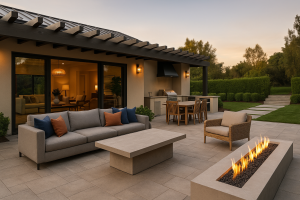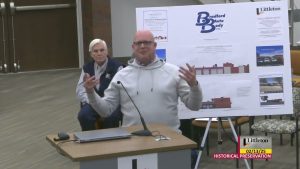Proper water pressure is essential for maintaining a smoothly functioning plumbing system. However, excessive water pressure can lead to significant problems if left unchecked. In this section, we will discuss the signs that indicate your water pressure is too high and highlight the importance of addressing this issue. By the end of this article, you will have a clear understanding of the effects of high water pressure and what you can do to mitigate the risks.
Understanding Water Pressure
Before we dive into the signs of high water pressure, it’s essential to understand what water pressure is and how it can affect your plumbing system. In simple terms, water pressure refers to the force that propels water through your pipes and fixtures.
The standard water pressure for most homes is between 40 to 80 pounds per square inch (psi). Anything above 80 psi is considered high water pressure and can wreak havoc on your plumbing system over time.
Excessive water pressure can cause leaks, bursting pipes, and damage to appliances. It can also lead to water waste, higher energy bills, and reduced efficiency in your water system.
Sign 1 – Constantly Running Toilets
One of the most telling signs of high water pressure is toilets that run continuously, even when not in use. This happens because the excessive pressure causes the fill valve to malfunction. When the valve fails to close properly, water continues to flow into the tank, leading to a constant, annoying noise and wasted water.
If left unaddressed, this issue can lead to a significant increase in your water bill and even cause damage to your toilet’s internal components. Over time, this can result in the need for costly repairs or replacement.
How to Fix It
The best solution for fixing constantly running toilets due to high water pressure is to install a pressure reducing valve (PRV). This device will reduce the water pressure to a safe level and prevent the valve from malfunctioning. It’s important to have a licensed plumber install the PRV, as the process involves cutting and modifying your main water line.
Sign 2 – Leaking Faucets and Pipes
Another common sign of high water pressure is leaking faucets and pipes. While it may seem like a minor inconvenience, these leaks can lead to significant damage and cost you money in wasted water.
Increased water pressure puts a strain on your pipes and fixtures, causing them to crack or loosen over time. You may notice leaks around the base of faucets or where pipes connect to appliances. If left unaddressed, these leaks can cause water damage to your home and lead to mold growth.
| Effects of High Water Pressure on Pipes and Faucets | Solutions |
|---|---|
| Cracked pipes and fittings | Replace damaged pipes and fittings with ones rated for high pressure. |
| Loose fittings that leak water | Tighten fittings or replace them if necessary. |
| Leaking faucets | Replace washers, valve seats or the entire fixture if it’s too damaged. |
If you notice any leaks in your system, it’s important to address them as soon as possible to prevent further damage and reduce water waste. A licensed plumber can assess the situation and recommend the appropriate solutions.
Sign 3 – Water Hammering
Water hammering is a common sign of high water pressure and is often described as a loud banging noise that occurs in your pipes when you turn off a faucet or appliance. This noise is caused by the sudden change in water flow and pressure, which causes the pipes to vibrate and shake.
Water hammering can cause damage to your plumbing system over time, including cracks and leakage. In addition to the noise, it can also lead to a decrease in water pressure and damage to your appliances.
Causes of Water Hammering
Water hammering is typically caused by high water pressure, but it can also be the result of loose pipes or valves. When water is flowing at a high pressure, it builds up momentum and creates a shock wave when it abruptly stops. This shock wave causes the pipes to vibrate and the banging noise that you hear.
Risks of Water Hammering
Water hammering can lead to damage to your plumbing system, including cracked pipes and damaged appliances. Over time, the excessive pressure can weaken your pipes, leading to leaks and other issues. In addition, the sudden pressure changes can cause damage to washing machines, dishwashers, and other appliances that rely on a consistent water supply.
If you notice water hammering in your home, it’s important to address the issue as soon as possible to prevent damage to your plumbing system and appliances.
Sign 4 – Shortened Appliance Lifespan
High water pressure doesn’t just affect your plumbing system’s functionality; it can also significantly reduce the lifespan of your appliances. Appliances such as washing machines and dishwashers are particularly vulnerable to excessive water pressure due to their reliance on water flow.
When the water pressure is too high, your appliances are forced to work much harder than they should, leading to premature wear and tear. This can result in costly repairs, and in severe cases, the need for replacement.
As high water pressure can lead to appliance damage, it’s crucial to take preventative measures to protect your investments. One solution is to install a pressure-reducing valve (PRV) to regulate your home’s water pressure. A PRV works by limiting the water supply’s pressure and ensuring it remains at a safe and optimal level for your appliances and plumbing system.
Another way to protect your appliances is by checking the manufacturer’s recommendations for the maximum water pressure levels they can handle. This information is typically found in the owner’s manual or on the manufacturer’s website. With this knowledge, you can determine if your water pressure exceeds the recommended level and take appropriate action.
Sign 5 – Water Spraying from Fixtures
If you notice water spraying forcefully from your fixtures, such as showerheads or faucets, it is likely a sign of high water pressure. This occurs because the increased pressure causes the water stream to break into droplets, resulting in a less efficient and wasteful flow.
The forceful nature of the water spray can also damage your fixtures over time. It can cause a buildup of sediment and mineral deposits, leading to corrosion and leaks.
Potential Risks:
| Impact | Explanation |
|---|---|
| Wastage of water | The forceful spray leads to an inefficient flow of water, causing unnecessary water wastage. |
| Fixture damage | The constant high-pressure spray can cause erosion and corrosion of your fixtures, leading to leaks and increased long-term maintenance costs. |
If you notice water spraying from your fixtures, it is essential to address the issue promptly to avoid further damage. Please refer to Section 9 for solutions on how to lower your water pressure.
How to Test Your Water Pressure
Testing your water pressure is a simple process that can be done at home with the help of a pressure gauge. Follow these steps to test your water pressure:
- Shut off all water-using appliances in your home, including faucets, showerheads, and sprinkler systems.
- Locate an outdoor faucet and remove any attachments, such as a hose or sprayer.
- Attach the pressure gauge to the faucet.
- Turn on the water to the faucet at full pressure.
- Read the pressure gauge to determine the water pressure.
Average water pressure typically ranges from 40-80 pounds per square inch (psi). If your pressure gauge reads higher than 80 psi, you may have high water pressure.
It’s important to test your water pressure regularly to ensure it remains at a safe level and address any potential issues before they cause damage to your plumbing system.
How to Lower Your Water Pressure
If you have determined that your water pressure is too high, it is essential to take action to avoid potential damage to your plumbing system. Here are some practical tips to help lower your water pressure:
1. Adjust the Pressure Regulator Valve
A pressure regulator valve can help control water pressure and is usually located near your home’s main water supply. Use a pressure gauge to measure the current pressure and adjust the valve accordingly to reach a safe level.
2. Install a Pressure Reducing Valve
If adjusting the pressure regulator valve does not result in lower pressure, consider installing a pressure reducing valve. This valve will automatically regulate and reduce the pressure from your main water supply.
3. Check for Faulty Fixtures
High water pressure can also be caused by damaged or faulty fixtures. Check your faucets, showerheads, and other fixtures for leaks or other issues that may be contributing to high pressure.
4. Install a Water Hammer Arrestor
Water hammering, which can be caused by high water pressure, can damage your pipes and fixtures. Consider installing a water hammer arrestor to help absorb the shock and reduce pressure spikes.
5. Consult a Professional
If you are unsure how to lower your water pressure or are experiencing persistent high pressure issues, consult a professional plumber for assistance. They can help identify the root cause of the problem and recommend appropriate solutions.
The Importance of Addressing High Water Pressure
High water pressure can cause significant damage to your plumbing system, appliances, and property. It can also waste water and increase your utility bills. Therefore, it’s crucial to address high water pressure promptly to avoid these issues. Here are some reasons why:
- Prevent Leaks and Damage: High water pressure can cause pipes, faucets, and valves to leak or burst, leading to costly repairs and property damage. By reducing water pressure, you can protect your plumbing system and prevent leaks.
- Extend Appliance Lifespan: Excessive water pressure can reduce the lifespan of appliances that rely on water, such as dishwashers, washing machines, and water heaters. By maintaining appropriate water pressure, you can extend the lifespan of your appliances and save money on replacements.
- Conserve Water: High water pressure can cause water to be wasted through leaks and inefficient water use. By lowering water pressure, you can conserve water and reduce your utility bills.
- Ensure Safe and Comfortable Water Use: Very high water pressure can make it difficult to use appliances and fixtures properly. By adjusting the water pressure to a safe and comfortable level, you can ensure that your home’s water system functions optimally.
Keeping Water Pressure Under Control
It’s important to be aware of the signs of high water pressure and to take action to reduce water pressure if needed. Regularly testing your water pressure and making small adjustments can help you maintain a safe and efficient water system.
If you’re not comfortable testing or adjusting your water pressure, consider contacting a plumbing professional for assistance. They can help you identify any issues with your plumbing system and provide advice on how to address them.
FAQ – Frequently Asked Questions about High Water Pressure
Here are some commonly asked questions related to high water pressure:
What is the ideal water pressure for a home?
The ideal water pressure for a home is between 40-60 psi (pounds per square inch). Anything above this range can cause damage to your plumbing system and appliances.
Why is high water pressure dangerous?
High water pressure can cause damage to your plumbing system, such as pipe leaks or bursts. It can also decrease the lifespan of your appliances and waste water by causing excessive use. High water pressure can also result in increased water bills.
How can I check my water pressure?
You can check your water pressure by using a pressure gauge, which can be purchased at many home improvement stores. You can also call a professional plumber to check your water pressure for you.
Can high water pressure cause water hammering?
Yes, high water pressure can cause water hammering, which is a loud banging noise in your pipes when you turn off a faucet. This occurs when water is forced to abruptly stop or change direction due to excessive pressure.
Can I fix high water pressure on my own?
It is recommended to seek the assistance of a professional plumber to fix high water pressure, as it can be a complex issue. Trying to fix it on your own can cause further damage to your plumbing system.
What are some methods to lower high water pressure?
Some methods to lower high water pressure include installing a pressure regulator, adjusting the pressure reducing valve, or installing a pressure relief valve. A professional plumber can help determine the best solution for your specific situation.
How often should I have my water pressure checked?
It is recommended to have your water pressure checked by a professional plumber at least once a year. This can help detect any potential issues early on and prevent damage to your plumbing system.










